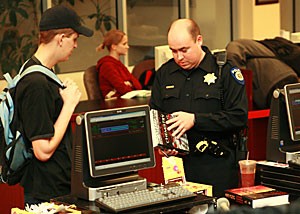With the semester nearing completion and finals gearing up next week, the Associated Students of the University of Arizona and the UofA Bookstores are collaborating to find alternative ways to sell back textbooks.
“”There is a committee in charge of textbooks, and we have 23 initiatives,”” said ASUA Sen. Steven Gerner. “”We have members from the UA libraries, the administration, ASUA and the Graduate and Professional Student Council, among others, looking for a solution to the issue.””
Many students who feel they don’t receive the right monetary amount from textbook buybacks tend to sell their books elsewhere.
“”I sell my textbooks to incoming freshmen or to people taking the class next year,”” said Ashlin Blum, a chemical engineering sophomore.
Other students have not even thought about selling their textbooks and said they will sell their books to the bookstore.
“”It’s all pretty much, what you’re gonna get is what you get,”” said Andy Watt, a pre-business junior.
Some other students said they feel that publishers are a major problem.
“”I think (the bookstores) do all they can,”” said Joel Petty, a speech, language and hearing sciences senior who works at the UofA Bookstore. “”It seems more like the publishers than the bookstore that sets how much you get when you sell your book.””
The bookstore generally offers 25 percent of the textbook’s original price back to the students, then sells it back to wholesale companies. The wholesale companies sell their books at a high percentage and, unless the bookstore knows whether or not the book will be used again, has to sell the book back to the wholesale company at a higher cost. This is difficult for the bookstore because of other costs, such as paying staff, said Gerner, a political science senior.
If the bookstore knows how many books to order for an instructor, the bookstore can eliminate the wholesale company in the middle and offer to buy back books at a better price for students because the book will be used again in the future, Gerner said.
But if the instructor does not know if the textbook will be used again, it is difficult for the bookstore to compensate for the wholesale companies.
“”We are working on a campaign to get faculty and students more aware of textbook costs,”” Gerner said. “”We have a faculty campaign that will hopefully start in late January or early February and a student campaign in April.””
Another alternative textbook selling option that is open for students is an online used-books classifieds program started by the bookstore.
“”Not very many students know about this program,”” said ASUA Sen. Jen Dang, a psychology senior. “”But the bookstore uses the classifieds to keep textbook trade in the student market.””
The Web site has 2,286 listings on its classified page and students can list their textbooks at any asking cost. It is accessible through the UofA Bookstore Web site, www.uofabookstores.com/uaz.
Another option for students is a textbook donation program where students can donate their textbooks to the library.
“”We are hoping to create a library textbook section in the library comprised of common books that students can check out for two hours at a time,”” Gerner said.
Students can donate their textbooks at the ASUA Office Monday through Friday from 8 a.m. to 5 p.m., Gerner said.
“”We have a lot of options in the works, and we have a couple options being implemented next semester,”” said Dang.
One of the options for next semester is a rental program that will allow students to rent out textbooks at a fixed cost, about 30 percent off retail price, and then return the book to the bookstore and maybe get some money back, Dang said.









